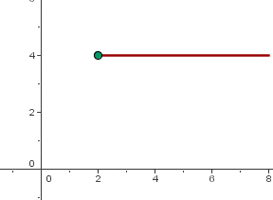Chapters
Essential discontinuity is one of the types of discontinuity in the topic of limits. One thing is clear that you will find discontinuity in this topic but the behaviour of discontinuity also matters. That is why mathematicians made different types of discontinuity. Let's say you have a function  for range
for range  . The function starts from
. The function starts from  and goes to negative infinity but if the limit is approached from the right to left, we won't get anything because the range of the function starts from
and goes to negative infinity but if the limit is approached from the right to left, we won't get anything because the range of the function starts from  , after
, after  , there is nothing, you can call it void. Hence limit beyond 2 doesn't exist. There is a discontinuity point at
, there is nothing, you can call it void. Hence limit beyond 2 doesn't exist. There is a discontinuity point at  but what kind of discontinuity? Since the limit beyond
but what kind of discontinuity? Since the limit beyond  doesn't exist, we will call it essential discontinuity or infinite discontinuity. There are two conditions for essential discontinuity, if one of them is true, you can declare the limit has an essential discontinuity. Below are the conditions:
doesn't exist, we will call it essential discontinuity or infinite discontinuity. There are two conditions for essential discontinuity, if one of them is true, you can declare the limit has an essential discontinuity. Below are the conditions:
- The left or right side limit is infinite
- The left or right side limit do not exist



At  there is an essential discontinuity because there is no right side limit.
there is an essential discontinuity because there is no right side limit.

Examples
You might note one more thing in essential discontinuity. Usually, there is a point of discontinuity, but there is an asymptote in the case of essential discontinuity. For example,  . Let's apply limits to check the discontinuity asymptote.
. Let's apply limits to check the discontinuity asymptote.


At  there is an essential discontinuity because the right-side limit is infinite. Draw a line on
there is an essential discontinuity because the right-side limit is infinite. Draw a line on  , it becomes an asymptote. Therefore, many mathematicians agree that essential discontinuity has a discontinuous asymptote.
, it becomes an asymptote. Therefore, many mathematicians agree that essential discontinuity has a discontinuous asymptote.



At  there is an essential discontinuity because there is no left side limit.
there is an essential discontinuity because there is no left side limit.
Summarise with AI:













Derivative of denominator is wrong
Good catch—thanks for pointing that out! We’ll double-check the derivative in that section and make any necessary corrections. Really appreciate you taking the time to flag it. 👍
Thank you
Thank you Abbas! Good luck with your studies!
With regard to the Zero Over a Number item, is there a mis-statement? It’s immediately followed by “If a number is divided by zero which means that the numerator is zero and the denominator is the number, then the result is zero.”
Hi Mark,
You’re absolutely right to raise the question — there does appear to be a misstatement in that sentence. The phrase “If a number is divided by zero, which means that the numerator is zero and the denominator is the number…” is indeed misleading and should be corrected.
To clarify:
Zero divided by a number (e.g. 0 ÷ 5) equals 0.
A number divided by zero (e.g. 5 ÷ 0) is undefined.
We’ll update the sentence to reflect the correct mathematical explanation. We appreciate you catching that and helping us improve the accuracy of the content!
There is more than one size of infinity, though. What if you multiply the infinity of the whole numbers (Aleph-0) by the infinity of the real numbers (fraktur-c)?
Thanks a lot to you for this essentiol article.
Hi Piyash! Thanks for your comment, great to hear that you found this useful!
Very nice